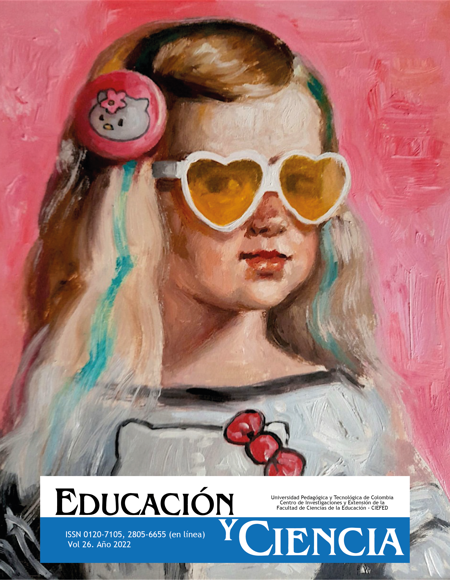Philosophy for children and philosophy with children: an inspiring experience in thinking about mathematics

Abstract
The article presents the results of the project Transformation of mathematics learning from philosophy for/with children, developed at the Institución Educativa Agropecuaria el Escobal, in the municipality of Ramiriquí. The objective was to analyze the contribution of Philosophy for/with Children in the mathematics learning process of the participating students. The research method was qualitative with a critical-social approach. The study was developed in four moments: theoretical approach, documentation of the need, application of the experience and analysis. The results are divided into four sections: voices to think about mathematics, making thoughts and dialogues visible; a space for emancipation and autonomy, which exposes interests and ways of understanding mathematics; the care of oneself, of the other and of the other present in mathematics and philosophy makes factors implicit in the mathematical situations presented visible; the learning communities. An experience with mathematics emphasizes collaborative work, philosophical dialogue, questioning and investigating. In conclusion, it is possible to strengthen the learning process of mathematics through philosophizing.
Keywords
teaching mathematics, teaching philosophy, childhood, philosophy for children, philosophy with children
References
- Almanza, M. (2017). La implementación de una comunidad de indagación al estilo de Filosofía para Niños y la posibilidad de construir una identidad democrática en los niños de grado sexto del colegio General Gustavo Rojas Pinilla IED. [Trabajo de grado, Universidad Santo Tomás]. https://repository.usta.edu.co/bitstream/handle/11634/9316/AlmanzaMyriam2017.pdf DOI: https://doi.org/10.15332/tg.mae.2017.00311
- Bardin, L. (1996). Análisis de contenido (2a. ed.). Akal. .
- Cruz, I., Castro, L., y Ojeda, M. (2020). Comunidad de indagación como ambiente de aprendizaje: una propuesta y una apuesta. Educación y Ciencia (24), e11404. 1-17 https://doi. org/10.19053/0120-7105.eyc.2020.24 DOI: https://doi.org/10.19053/0120-7105.eyc.2020.24.e11404
- Díaz, J., y Lara, P. (2020). Aproximaciones a la ética foucaultiana. En O. Pulido (Coord.) Experiencia, Ética y Sujeto en el último Foucault (pp. 59-97). Editorial UPTC. http://repositorio.uptc.edu.co/handle/001/3249
- Elliot, J. (2000). La investigación-acción en educación (4ª. Ed.). Morata, S.L. http://www.terras.edu.ar/biblioteca/37/37ELLIOT-Jhon-Cap-1-y-5.pdf.
- Fernández, J. (2007). Metodología didáctica para la enseñanza de la matemática: variables facilitadoras del aprendizaje. En D. Camarena(Coord.) Aprender matemáticas (pp. 9-26)
- Freire, P. (2004). Pedagogía de la Autonomía. Saberes necesarios para la práctica educativa. Paz e Terra S.A.
- Foucault, M. (1994). Hermenéutica del Sujeto. La Piqueta.
- Hadot, P. (2006). La Filosofía como forma de Vida. Madrid: Siruela S.A.
- Hernández, R., Fernández, C., y Baptista, M. (2014). Metodología de la Investigación. Mc
- Graw Hill.
- Kant, E. (2009). ¿Qué es la Ilustración? Foro de Educación, 7(11), 249-254. https://www.forodeeducacion.com/ojs/index.php/fde/article/view/137
- Lipman, M. (2016). El lugar del pensamiento en la educación. Octaedro.
- Lipman, M., Sharp, A., y Oscanyan, F. (1992). La filosofía en el aula (1 ed.). De La Torre.
- Marín, J. (2006). Del concepto de paradigma en Thomas S. Kuhn, a los paradigmas de las ciencias de la cultura. Revista Magistro, 73-88. DOI: https://doi.org/10.15332/s2011-8643.2007.0001.06
- Mariño, L. A. (2019). Entrevista a Diego Antonio Pineda Rivera sobre educación filosófica en Colombia. Cuestiones de Filosofía, 5(24), 173-186. https://doi.org/10.19053/01235095.v5.n24.2019.9035 DOI: https://doi.org/10.19053/01235095.v5.n24.2019.9035
- Pineda, D. (1992). Filosofía para Niños: un acercamiento. Universitas Philosophica, 10(19).
- Pineda, D. A. (2004). Filosofía para niños el ABC. Beta.
- Polo, J. (2017). Fortalecimiento del Área de Matemáticas Mediante la Gestión de un Espacio cadémico que Permita Mejorar Resultados en Pruebas Externas en la I.E. Técnico Agropecuaria La Esmeralda en Chivor, Boyacá. [Tesis de Maestría, Universidad Católica de Manizales]. https://repositorio.ucm.edu.co/handle/10839/173
- Pulido, O., y Espinel, O. (2020). Peligrosidad, Problematización y Seducción. En O. Pulido (Coord.). Experiencia, Ética y Sujeto en el últiREmo Foucault (pp. 9-29). Editorial UPTC. https://www.researchgate.net/publication/350456493_Peligrosidad_problematizacion_y_seduccion_El_ultimo_Foucault_y_sus_categoria_teorico-metodologicas
- Pulido, O., Mariño, L. y Hernández, A. (2021). Prácticas pedagógicas que constituyen sujetos, saberes e instituciones en la perspectiva de filosofía e infancia. En M. Suárez, y O. Pulido (Coord.) Diagramas y Polifonías. Experiencias de Pensamiento (pp. 43-85). Editorial UPTC.
- Rancière, J. (2003). El Maestro Ignorante. Cinco lecciones sobre la emancipación intelectual. Ediciones Laertes.
- Rodríguez, M. E. (2020). Un dialogo ineluctable: matemática-complejidad, y una necesidad: ¡yo sólo sé que no se nada! Diálogo, (45), 43-55.
- Suarez, M. (2002). Algunas reflexiones sobre la investigación-acción colaboradora en la educación. Revista Electrónica de Enseñanza de las Ciencias,1(1), 40-56. http://reec.uvigo.es/volumenes/volumen1/REEC_1_1_3.pdf
- Waksman, V., y Kohan, W. (2009). Filosofía con niños aportes para el trabajo en clase. Novedades Educativas.
